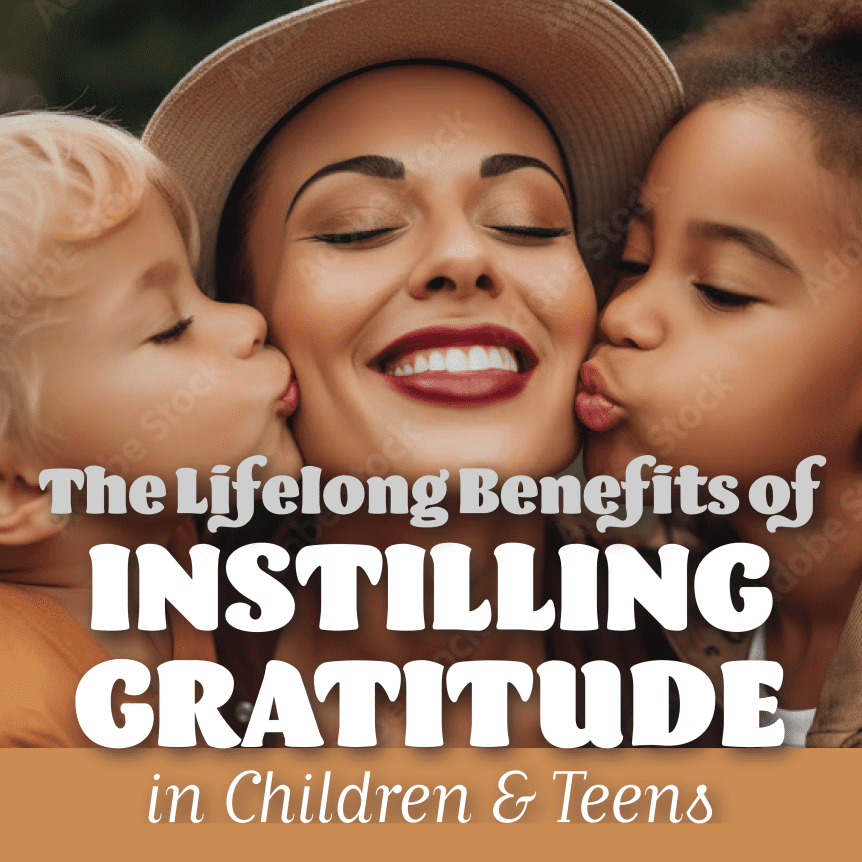During the holiday season, we are encouraged to think of others and count our blessings. You may have heard the saying attitude of gratitude. This rhyme helps remind us to practice gratitude. Gratitude is the quality of being thankful and showing appreciation for what we have. As parents, we are in the unique position to model gratitude and instill this quality in our children. When we practice gratitude on a regular basis, it not only impacts our mental and physical health, but impacts those around you in a positive way. Instilling a sense of gratitude in children can have lifelong benefits.
Ideas for practicing gratitude as a family:
Build gratitude into your daily schedule – and practice it! At the family dinner table, everyone can share one thing that happened during the day for which they are grateful. It can be small, such as ‘it was raining today and I was grateful my friend shared their umbrella. Noticing the small, positive things that happen during a day can increase gratitude and positive emotions.
Keep a gratitude jar. Have your kids decorate a jar and each day, put a note inside that lists something for which you are grateful. In addition to see how quickly all of those ‘good things’ add up, you can pick a day, such as Thanksgiving or Christmas and read them aloud. Hearing about all the wonderful things you have been grateful for in the past year can further increase gratitude.
Hit the pause button. Most of us feel frustrated by something in a normal day. When you find yourself feeling upset or frustrated, hit the pause button and reset your thinking. Come up with something positive about the situation or think about something else entirely that you are thankful for. Model this behavior in front of your children. For example, someone cuts you off in traffic, how should you react? Let your children know you are grateful the driver’s reckless behavior did not cause an accident!
Take advantage of the holiday season. The holiday season offers an excellent opportunity to practice gratitude as a family. During your holiday meal celebration, go around the table and have each family express how they appreciate the other.
Some prompts could include:
“Thank you for…”
“What I love about you…”
“My holiday wish for you…”
In positive psychology research, gratitude is strongly and consistently associated with greater happiness. Gratitude helps people feel more positive emotions, relish good experiences, improve their health, deal with adversity, and build strong relationships. Gratitude is a wonderful skill to develop in children and teens and they will benefit from this practice throughout their life.
5 Benefits of Gratitude
Expressing Gratitude Improves Mood
Simply writing or stating a reason to be thankful can improve mood. Encourage kids and teens to make a habit of expressing gratitude and they are more likely to report positive emotions such as happiness and satisfaction. This can help to improve symptoms of anxiety and depression, both of which limit the amount of pleasant, positive emotions that are experienced day-to-day. People who regularly express gratitude for the positive things in their life are shown to be happier overall, leading to lower rates of stress and depression.
Gratitude Increases Social Connection
People have reported feeling more loved and more connected to others in their lives when they routinely practice gratitude or those around them practice gratitude. Sharing gratitude can improve our children’s social bonds with family and friends. In a recent study of high school adolescents’ social media use and gratitude, results suggest that gratitude may be associated with the use of social media for meaningful conversations but does not increase overall social media use (Maheux et al., 2021). Many teens connect to their peers more frequently through social media over in-person interactions. Try encouraging more #gratitude posts and reap the benefits of stronger friendships.
Gratitude Helps To Reduce Suicide Risk
Previous research has established that gratitude reduces suicide risk in young adults by reducing depression and increasing self-esteem (Lin, 2015). In a more recent study, positive self-compassion that includes gratitude helped to reduce suicide risk among adolescents following a traumatic experience (Liu et al., 2020). Studies show that those who express gratitude regularly appear to have a more positive outlook on life. Given the increased risk of suicidal ideation for teens struggling with anxiety and depression, the use of gratitude can help to manage of one mental health’s most dangerous symptoms. Gratitude can be a cost-free mental health intervention with significant benefits.
Practicing Gratitude Improves Sleep And Overall Health
Both anxious and depressed children tend to experience disturbances in sleep, and gratitude may be the answer. Research has shown that thinking about the things we are grateful for just before bed can improve sleep quality and duration (Wood et al., 2008). Try a little gratitude journaling or saying a prayer of gratitude at bedtime to activate these grateful thoughts. People who actively express gratitude tend to be more engaged in activities to take care of their physical health, like eating well and exercising. This leads to higher energy levels, better sleep and a stronger immune system, or the ability to fight off illness or infection.
Parents And Caregivers Can Model Gratitude At Home
Good news! When parents are more grateful, their children often express more gratitude (Rothenberg et al., 2016; Hussong et al., 2018). As we continue a season of gratitude this year, be sure to model your gratitude by sharing thanks for the people and things that bring joy to your life. Bonus points if you turn this exercise into a way to praise your children (e.g., “I am so grateful that my kids work hard in school and have been so helpful around the house.”) and reap the benefits of increased joy and positive emotion.
Michelle Yetman, PhD
Clinical Psychologist, LSUHS Children’s Center
Associate Professor, School of Allied Health Professions
LSU Health Shreveport








